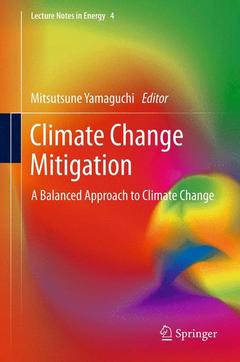Description
Climate Change Mitigation, 2012
A Balanced Approach to Climate Change
Lecture Notes in Energy Series, Vol. 4
Coordinator: Yamaguchi Mitsutsune
Language: English
Subjects for Climate Change Mitigation:
Publication date: 07-2014
264 p. · 15.5x23.5 cm · Paperback
Publication date: 06-2012
264 p. · 15.5x23.5 cm · Hardback
Description
/li>Contents
/li>Biography
/li>Comment
/li>
Climate change is mainly caused by emissions of CO2 from burning fossil fuels, which provides over 85% of the world?s energy. Strategies for mitigating climate change are connected with handling economic and social activities through their effects on the use of energy. Climate Change Mitigation investigates the costs of mitigation measures in comparison to their benefits, and compares the effects of implementing mitigation measures on various areas such as energy security and energy economy.
?For 20 years, diplomats have struggled to make progress on climate change, mostly because global diplomacy is not well-linked to the realities of how nations and firms control emissions and adapt to the impacts of a changing climate. In this excellent book, Dr Yamaguchi has assembled experts to guide the redesign of global policy. The authors underscore how global warming efforts must resonate with other policy goals.? David G. Victor, Director, Laboratory on International Law and Regulation and Professor, University of California San Diego
?Climate Change Mitigation clarifies that climate change cannot be controlled by sacrificing economic growth or other global problems; however, action to control climate change cannot be delayed.Climate policy is pervasive and affects all dimensions of international policy;but it cannot be too ambitious: a balanced approach between mitigation and adaptation, economic growth and resource management, and short term development and long term investments, should be adopted. I recommend its reading.? Carlo Carraro,President, Ca? Foscari University of Venice
?The International Energy Agency estimates for every $1 of investment now toward sustainable energy, $4 of future spending can be saved. There is a business case for companies to reduce energy use. Companies in the energy and resource intensive industries must lead the way.? Chad Holliday, Chairman. World Business Councilfor Sustainable Development and former Chair and CEO, DuPont
Introduction.- The ultimate objective of climate response strategies, and a desirable and feasible international framework.- Mitigation targets and effort-sharing among regions and countries.- Balance between energy security and mitigation responses.- Cost of mitigation.- Balance between mitigation and adaptation.- Policies and measures.- Potential for energy efficiency improvement and barriers.- Technology diffusion and development.- Nuclear Accident at the Fukushima Daiichi Nuclear Power Plant, and its impact on Japanese energy and climate policy.- Epilogue, IPCC and communication
Mitsutsune Yamaguchi is an environmental economist and Project Professor at the University of Tokyo. He is a member of several committees on climate change of the Government, Vice Chair of the Joint Working Party on Trade and Environment, Organization for Economic Co-operation and Development (OECD), and a lead author of Working Group III of the Intergovernmental Panel on Climate Change (IPCC) for the 3rd, 4th and 5th assessment reports.




